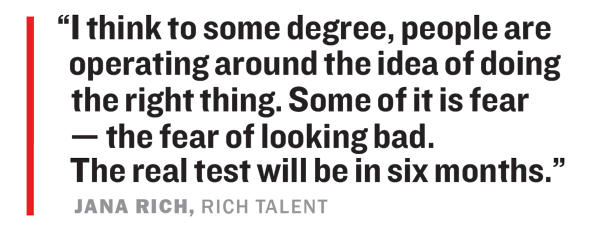 The protest movement that swept the globe in the wake of George Floyd’s death put corporate America under a microscope.
The protest movement that swept the globe in the wake of George Floyd’s death put corporate America under a microscope.
Like most of the business world, the real estate industry has long been controlled by white men, and the power of personal and professional networks has only reinforced racial disparities. For many minorities in the business, the lack of diversity has meant barriers to entry, barriers to ascension and routine workplace racism — both overt and subtle.
“Your pedigree is always questioned, and I have actually felt this way for my entire career,” said Tammy Jones, chief executive officer of Basis Investment Group, speaking in a panel discussion hosted by New York University’s Schack Institute of Real Estate in June.
Jones, who was interviewed by The Real Deal this month, said she was hopeful that the movement would lead to real change. Jim Simmons, of Asland Capital Partners, was also cautiously optimistic.
“I hope this is our Stonewall,” he said. “I hope this is our MeToo.”
In addition to igniting a national discourse, the protests have prompted some individuals to come forward with allegations of racism and microaggressions inside workplaces.
In June, whistleblowers contacted TRD about separate incidents inside two residential brokerages.
“I am finally reporting this because I feel we are all in a moment, where acts like this cannot be tolerated at any firm any longer, especially against minority groups,” said an anonymous sender who provided an email exchange between high-ranking executives at Core.
A second leaked email exchange, from Bushwick-based brokerage Nooklyn, showed Black broker Wileen Saint Louis calling out the company’s leaders for their response to the protests. “The silence of this company has spoken volumes to me and has been an utter disgrace,” she wrote. “Are we that invisible? Is this movement not worth a message?”

A string of agents responded to the email with their own complaints, including allegations of unequal treatment and lack of diversity at their firms and a failure from leaders to address complaints about discriminatory landlords.
In response to the accounts, Nooklyn CEO Moiz Malik said the company would “begin a review of landlord accounts that do not align with our values” and “establish a procedure for submitting housing discrimination-related complaints.” Asked about the other allegations of unequal treatment, Malik denied pay inequity at the company but acknowledged the need for change.
Other brokerage heads have also promised to lead cultural shifts inside their firms. In June, Corcoran Group’s Pam Liebman said in an email to agents that the leadership team would be taking a close look at the company and “redoubling our commitment to inclusion and justice.”
James Whelan, president of the Real Estate Board of New York, said the industry would come up with real solutions, “not just lip service.”
When TRD examined real estate’s diversity problem for a 2017 cover story, similar accusations against the industry emerged. But little changed. Developer Don Peebles, who last year launched a $500 million fund to invest in minority and female development firms, questioned the timing of the latest pledges.
“I think the industry is very late to the game,” he said in an interview this month. “It’s almost too little too late.”
Recently, some whistleblowers have taken their allegations to court.
In July, two Black former WeWork employees sued the company for racial discrimination and equal-pay violations. In one suit, the former head of diversity and inclusion, Christopher Clermont, said his image was often used in the company’s promotional materials, but in reality he was given “little in the way of responsibility.”
Clermont alleged that pay inequity and discrimination were so rampant at the company that Black employees and members had come up with the expression “WeWorking while Black.” A spokesperson for WeWork said the company had investigated the claims and “found them to be wholly without merit.”
And at a webinar in June hosted by Cushman & Wakefield broker Charlie Stephens, a racist comment was posted in the chat box about panelist David Moreno Jr., a Black attorney and co-founder of branding agency Mediabundance. “Yo moreno want chicken wings for dinner ??” the comment read.
“What really bothers me is to be a minority and have all these barriers we face as a community, and then there I was … trying to help everyone — and it was so hurtful and disheartening,” Moreno said in an interview.
The commenter appeared as “Juda Srour, CEO,” which is the name of the chief executive of flexible-office company Jay Suites. When contacted by TRD, Srour denied making the comment and said he had been impersonated.
While many companies and individuals in real estate have acknowledged the need for structural change, and some have taken a vocal stance against racism, the question remains: Will they put that sentiment into action?
In proptech, some firms have opted to focus their attention on reshaping their boards. This July, as it neared a presumptive IPO, flex-office startup Industrious announced it added Osei Van Horne, a managing director at Wells Fargo, as its first Black board member.
Compass’ Robert Reffkin has also spoken out about the need for greater diversity. In a recent television interview, he said 40 percent of Compass’ board is Black and 40 percent are women.
“We worked hard for that,” he added.
Reffkin praised Goldman Sachs for bringing more women onto its board, but urged the finance industry to offer the same support to minorities. “I would love to see one of the banks come out and take a stand around diversity of color, in addition to gender,” he said.
Executive recruiter Jana Rich, founder of San Francisco-based Rich Talent Group, said she had seen a sharp uptick in inquiries about diverse board candidates since June, as companies confronted their diversity problems and considered how to respond.
“I think to some degree, people are operating around the idea of doing the right thing,” she said. “Some of it is fear — the fear of looking bad. The real test will be in six months.”
Peebles noted that the issues the industry is now wrestling with are nothing new — and will not be going away.
“I’ve been telling our industry for years that the business model of exclusion is not sustainable,” he said.
“In order for it to survive and prosper again, it is going to need to be inclusive.”
